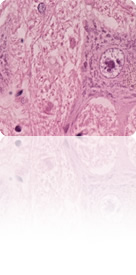
The Inflammatory and Neoplastic Dermatological Diseases research group comprises dermatologists, biologists, and immunologists who connect the wards with the lab benches, in a clear example of translational research.
The group follows two different lines of research:
The study of inflammatory dermatological diseases, mainly psoriasis, urticaria and bullous diseases.
- For psoriasis, we have developed a new in vitro model that allows us to study the mechanisms involved in the early stages of the disease, especially in guttate psoriasis. This model involves co-cultivating circulating CLA+ T cells (with cutaneous tropism) together with autologous epidermal cells from psoriasis sufferers, activated with Streptococcus pyogenes (SP) extract, a microbe that is a known psoriasis trigger. We also focus on characterising T-lymphocyte response in psoriasis, and, more recently, on the role of the humoral response.
- For urticaria, our current projects are related to characterising the clinical phenotypes of this disease, together with analysing the transcriptome of chronic spontaneous urticaria (CSU) and cold urticaria, and detecting possible biomarkers of evolution and clinical response to treatment.
- For autoimmune bullous diseases, our studies focus on the role the innate immune system plays in the pathogenesis of epidermolysis bullosa acquisita.
Research into pathogenic mechanisms of progression and immunological response in non-melanoma skin cancer.
- Our group also studies the relationship between inflammation and squamous cell carcinoma (SCC). Our preliminary results demonstrate that metastatic SCC displays improved levels of Polycomb (an epigenetic repressor family), and that Polycomb suppresses cytokine/chemokine expression in SCC cells. Our working hypothesis is that Polycomb’s suppression of cytokine/chemokine expression in SCC blocks the differentiation and function of the myeloid inflammatory component and favours a pro-tumour immune response.
The group has financing from the following companies, among others:



